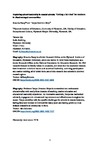Exploring school leadership in coastal schools: 'getting a fair deal' for students in disadvantaged communities
| dc.contributor.author | Passy, Rowena | |
| dc.contributor.author | Ovenden-Hope, T | |
| dc.date.accessioned | 2019-02-03T17:03:18Z | |
| dc.date.issued | 2019-02-13 | |
| dc.identifier.issn | 0268-0939 | |
| dc.identifier.issn | 1464-5106 | |
| dc.identifier.uri | http://hdl.handle.net/10026.1/13268 | |
| dc.description.abstract |
This paper is a response to an earlier article in the Journal of Education Policy, which calls for ‘new ideas and constructive principles and practices for the provision of socially-just education’. We first discuss how an economistic approach to education entrenches socioeconomic disadvantage and argue that, in the light of evidence that inequalities are increasing both nationally and internationally, it has become increasingly important that we understand models of social justice in schools in deprived locations. Reporting on original longitudinal research with schools in disadvantaged coastal areas in England, and drawing on the notion of the insistent affirmation of possibility, we then discuss three dimensions of active social justice undertaken by participating school leaders. By examining practical examples of social justice, we aim to shift the debate into more positive territory, in which there can be more appreciation of the efforts and outcomes of some leaders in highly disadvantaged areas and more leaders can take heart in following their example. | |
| dc.format.extent | 222-236 | |
| dc.language | en | |
| dc.language.iso | en | |
| dc.publisher | Taylor & Francis (Routledge) | |
| dc.subject | Coastal schools | |
| dc.subject | educational disadvantage | |
| dc.subject | active social justice | |
| dc.title | Exploring school leadership in coastal schools: 'getting a fair deal' for students in disadvantaged communities | |
| dc.type | journal-article | |
| dc.type | Journal Article | |
| plymouth.author-url | https://www.webofscience.com/api/gateway?GWVersion=2&SrcApp=PARTNER_APP&SrcAuth=LinksAMR&KeyUT=WOS:000508857700005&DestLinkType=FullRecord&DestApp=ALL_WOS&UsrCustomerID=11bb513d99f797142bcfeffcc58ea008 | |
| plymouth.issue | 2 | |
| plymouth.volume | 35 | |
| plymouth.publication-status | Published | |
| plymouth.journal | Journal of Education Policy | |
| dc.identifier.doi | 10.1080/02680939.2019.1573382 | |
| plymouth.organisational-group | /Plymouth | |
| plymouth.organisational-group | /Plymouth/Faculty of Arts, Humanities and Business | |
| plymouth.organisational-group | /Plymouth/Faculty of Arts, Humanities and Business/Plymouth Institute of Education | |
| plymouth.organisational-group | /Plymouth/REF 2021 Researchers by UoA | |
| plymouth.organisational-group | /Plymouth/REF 2021 Researchers by UoA/UoA23 Education | |
| plymouth.organisational-group | /Plymouth/Research Groups | |
| plymouth.organisational-group | /Plymouth/Research Groups/Institute of Health and Community | |
| plymouth.organisational-group | /Plymouth/Users by role | |
| plymouth.organisational-group | /Plymouth/Users by role/Academics | |
| dcterms.dateAccepted | 2019-01-18 | |
| dc.rights.embargodate | 2020-8-12 | |
| dc.identifier.eissn | 1464-5106 | |
| dc.rights.embargoperiod | Not known | |
| rioxxterms.versionofrecord | 10.1080/02680939.2019.1573382 | |
| rioxxterms.licenseref.uri | http://www.rioxx.net/licenses/all-rights-reserved | |
| rioxxterms.licenseref.startdate | 2019-02-13 | |
| rioxxterms.type | Journal Article/Review |


